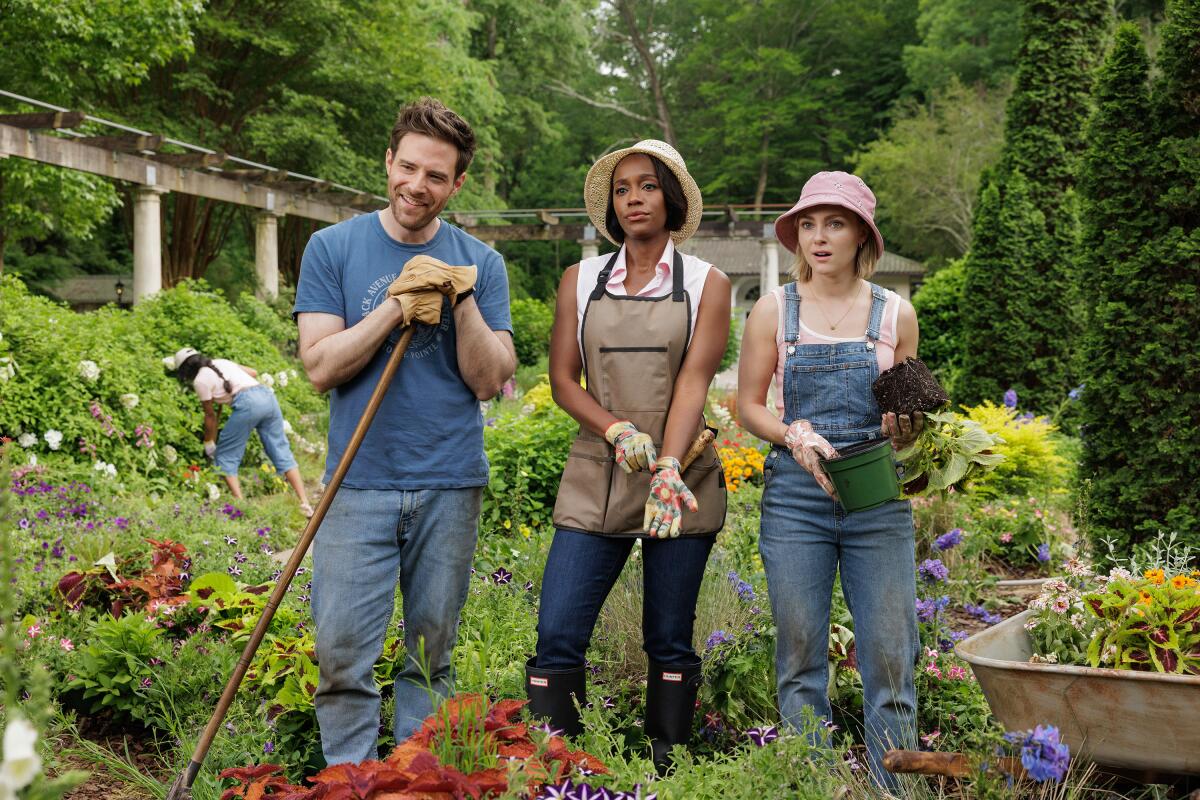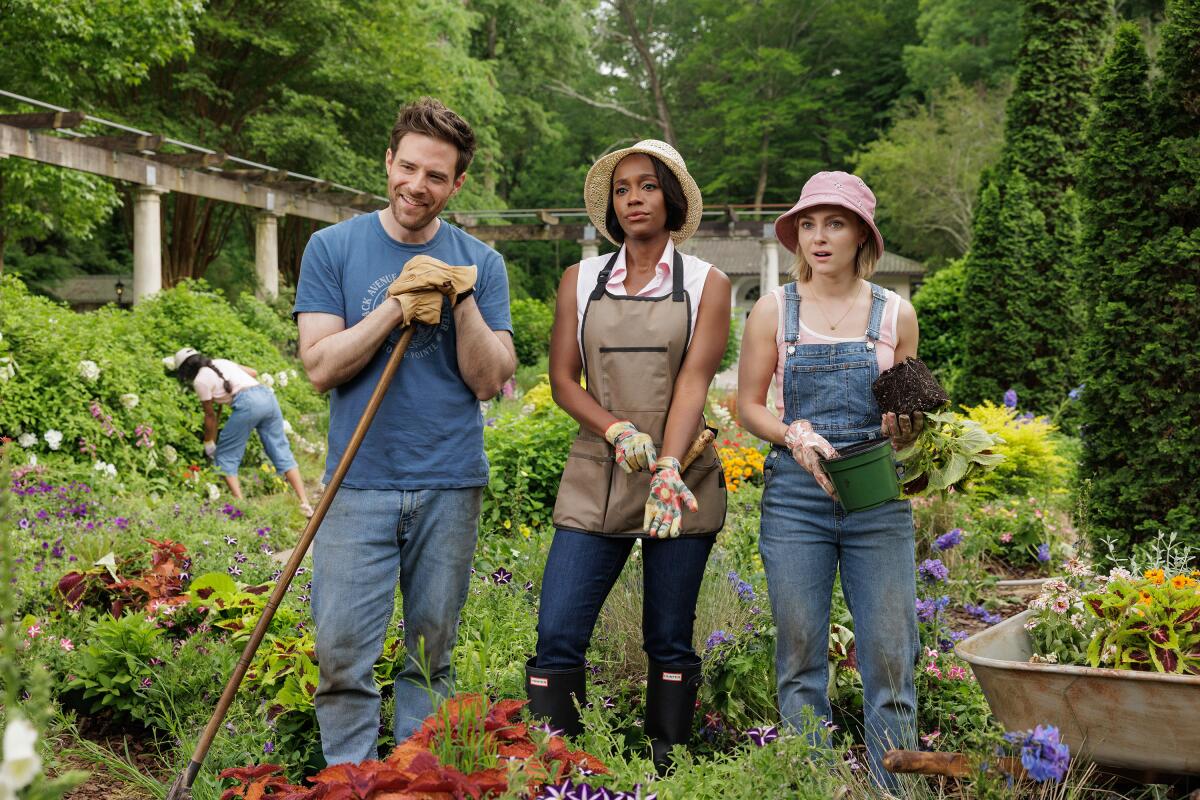Now that we’ve passed “peak talking about peak TV,” and the streamers have settled down to producing a seemingly endless round of expensive thrillers, the particular charms of bread-and-butter broadcast television are coming back into focus.
Of course, we consume these things differently since streaming took over the world, and arguably since man first learned to program a VCR, with network shows subsumed into the ocean of time-shifted picking and choosing. (People do still watch TV over the air. It’s the low-cost alternative to cable and subscription services, and how many stations do you need, really? Life is short, and its quality will not improve significantly because you’re able to see “Squid Game.” Maybe the opposite.)
Even so, network TV retrains its individuality. This may have something to do with industrial consistency; house style (each network has one); in acts based around commercial breaks; in playing to a broader audience; with shows released weekly, often across longer seasons. The relative modesty of broadcast television series doesn’t preclude inventiveness, and the popularity of those shows on streaming services speaks to their appeal. (“Seinfeld” was born there.) No other platform can beat broadcast for multi-camera sitcoms, and family comedies dressed as police procedurals, and really, most anything to do with family.
NBC, the National Broadcasting Company, has two new series premiering Sunday night, “Grosse Pointe Garden Society,” a dark comic soap opera, and “Suits LA,” a brand revival of “Suits,” which ran on USA Network from 2011 to 2019 and has become popular rerunning on Netflix. (“Suits” came out of basic cable, but formally speaking, that’s just broadcast TV with some bad words.)
“Grosse Pointe Garden Society” is set in the upscale, i.e. snooty, Detroit suburb of that name. As in “The White Lotus,” a murder is revealed at the start — there’s a body wrapped in a quilt — but who the victim is, and how and why they were killed is hidden from the audience. The story develops along two tracks, in the present day, the pre-murder timeline, and “six months later,” in the post, with the future-set scenes given a spooky blue tint, and transitions between the two marked with titles cleverly integrated into the decor.

Ben Rappaport as Brett, Aja Naomi King as Catherine and AnnaSophia Robb as Alice in NBC’s “Grosse Pointe Garden Society.”
(Steve Swisher / NBC)
The action centers on the eponymous garden club, within which Alice (AnnaSophia Robb), Brett (Ben Rappaport) and Catherine (Aja Naomi King) have formed a little team, soon to be joined by Birdie (Melissa Fumero), arriving by court order, having wrecked a city fountain with her car. (It’s a strange sort of community service, but it’s a strange sort of community.) A fundraising gala is on the horizon — the horizon just over which the future-set scenes take place. (Alice and Brett are not upscale people.)
Everyone’s got some sort of trouble. Alice, married to Doug (Alexander Hodge), has literary ambitions but is teaching English to entitled students with entitled parents; in a narrative preamble, she characterizes herself as a geranium, and “the worst thing you can do to a geranium is plant one where it doesn’t belong.” (She is neither upscale nor snooty.) More to the point, she has become emotionally overwrought, and prone to making bad decisions, on account of her dog being lost, and then found — murdered. (It is not the dog’s body in the quilt.)
Brett, Alice’s best friend and extramarital emotional support, is a divorced dad who manages a garden center and dreams of running a car restoration business; his nemesis is the new husband (Josh Ventura) of his ex-wife Melissa (Nora Zehetner), who anyone but Melissa can see is attempting to alienate his children’s affection. Catherine, a real-estate agent who can’t get her husband to notice her, is having an affair with a skeezy colleague, Gary (Saamer Usmani), who she believes might care for her. Oh, the fool.
Birdie, who starts out as a caricature of a society drunk — “a classic lily of the valley, invasive, wild, with no boundaries and extremely toxic to everything that gets in its path,” in Alice’s narrative formulation — will develop into perhaps the series’ most sympathetic character. Divorced and seemingly otherwise alone — she thinks of her housekeeper as “my friend” — she’s connecting under false pretenses with a teenage boy she gave up as a baby for adoption. Meanwhile, her court-ordered membership in the garden club begins to grow into something like actual friendship.
Created by Bill Krebs and Jenna Bans (“Good Girls”), the series is neither a brassy satire like “Desperate Housewives” (for which Bans wrote many, many episodes) or a Kidman-Witherspoon beach-read production. Someone will die, which makes this comedy qualify as “dark,” and its people do have serious relationship issues. And yet there is something cheerful, even gentle about the show, even when characters, in the future timeline, are reckoning with the aftermath of the murder — it’s as if bodies started turning up in, say, “Northern Exposure.” I found myself easily invested in their stories and hoping the conventional best for them: domestic tranquility, no jail time.

Stephen Amell as Ted Black in the pilot episode of “Suits LA.”
(David Astorga / NBC)
What “Suits LA” carries over from its namesake would seem to be pretty people practicing corporate law, as they jockey for prominence within and without their firm(s). (This turns out to be a tale of two houses.) There are emotional entanglements — Ted (Stephen Amell), the central but not the most interesting character, formerly a federal prosecutor, now an L.A. entertainment slash criminal defense lawyer — has flashback issues with his father and some new issues with old friend and fellow lawyer Stuart (Josh McDermitt). But in the episodes out for review, it’s mostly about work and power.
Created like “Suits” by Aaron Korsh, the series starts out pretty ho-hum, as if contractual commitments to a delivery date left the work half-realized. But it has been the case on network television that no one knows what the show is or isn’t until it’s put on its feet, and while you may be stuck with your pilot, it’s possible subsequently to course-correct — that’s why cast members seen in a first episode might disappear forever, while new ones walk through the door in the second or third. As the show goes on, it becomes a little more interesting — not the main story, so much, which involves Ted’s defense of a producer accused of murder, on which he is staking his professional reputation. It takes up a lot of air without being in the least compelling.
But around the edges, in the lesser plots and comic moments — we get the device of celebrities appearing as themselves, including Brian Baumgartner, Kevin from “The Office,” wanting to become an Oscar-worthy dramatic actor — and among characters not required to wear a hero’s mantle, embers are glowing. (Hollywood as a subject is hardly worth addressing except as comedy.) McDermitt, Bryan Greenberg as lawyer Rick and Alice Lee as excitable junior lawyer Leah, taking her boss Erica (Lex Scott Davis) to film school, suggest people worth hanging out with — which is how these series can run for years, creating the familiarity you can’t spell without “family.”
